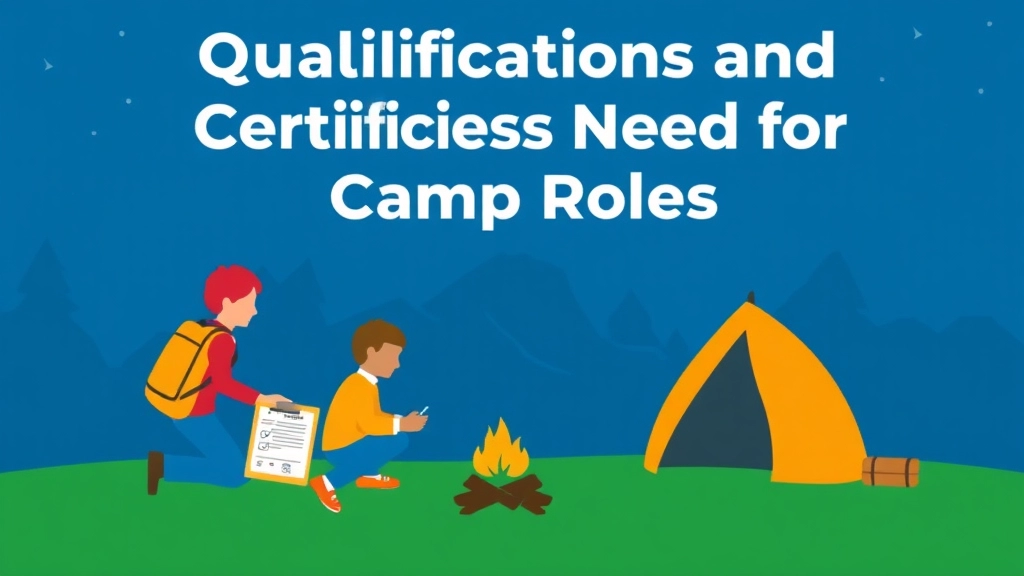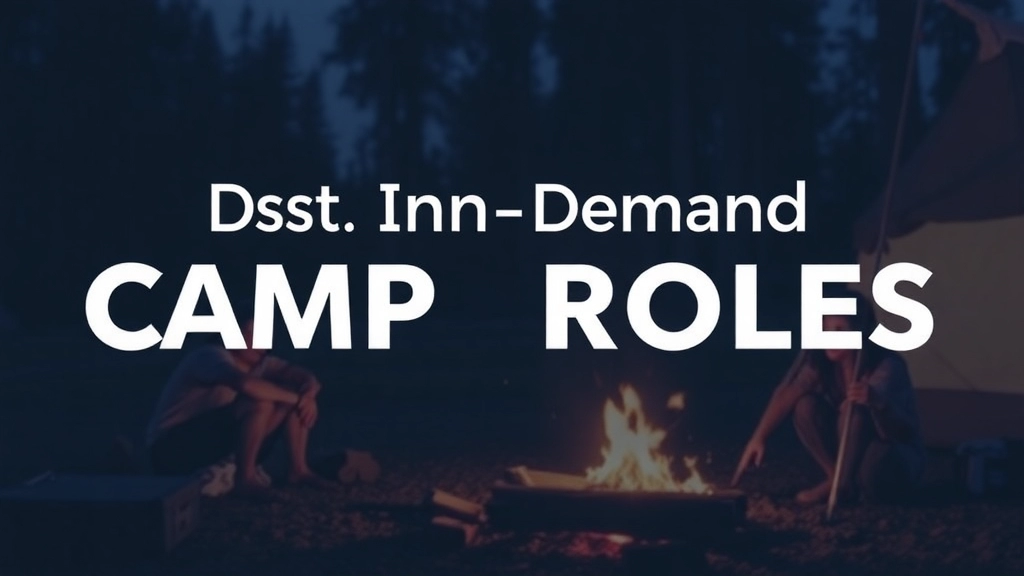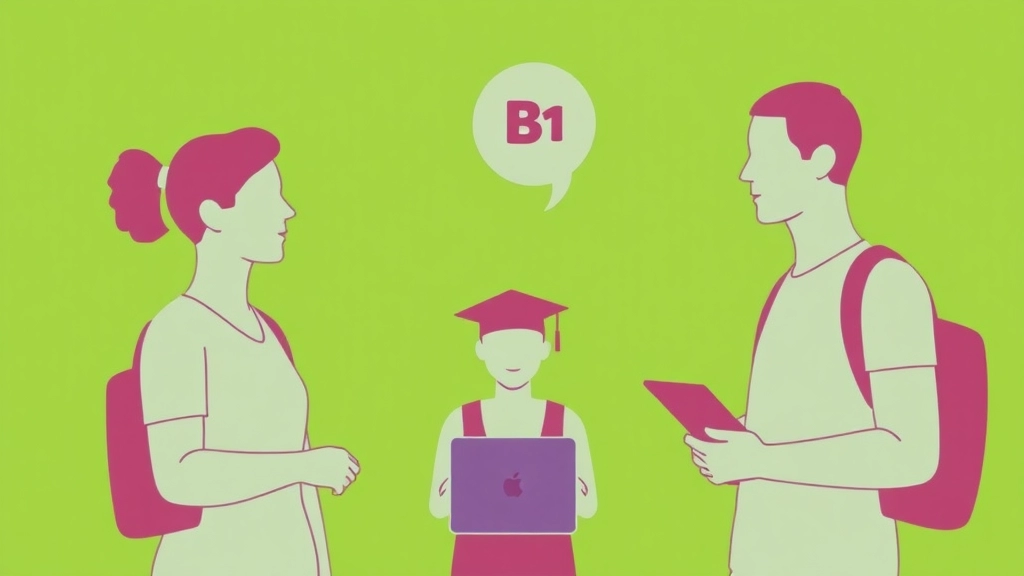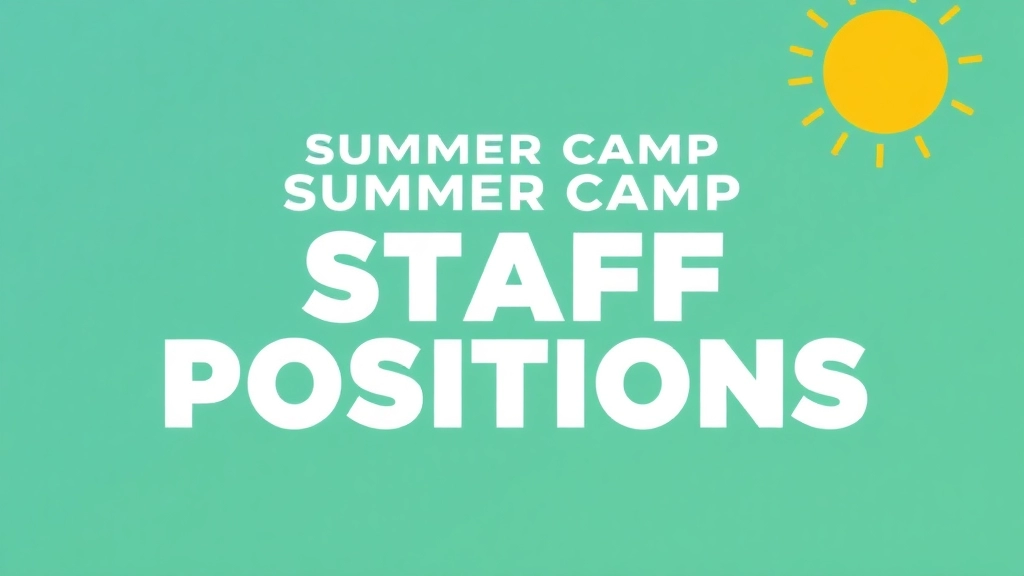Summer Camp Staff Positions
Summer camp staff positions offer a unique blend of adventure, responsibility, and career development. From camp counsellors and activity specialists to kitchen and medical staff, each role plays a vital part in creating an unforgettable experience for campers. In this article, we’ll explore the various types of summer camp staff
Types of Summer Camp Staff Positions
Alright, let’s dive into the types of summer camp staff positions. You might be wondering, “What roles can I actually get at a summer camp?” Well, there’s a lot more than just being a camp counsellor. Here’s the lowdown on the different positions you can snag at a summer camp.
Camp Counsellors
Camp Counsellors are the heart and soul of any summer camp. They’re the ones directly interacting with the kids, leading activities, and ensuring everyone has a blast. Think of them as the big brothers and sisters of the camp world. They live in the cabins with the campers, so they need to be ready for anything, from late-night chats to early morning wake-up calls.
Activity Specialists
Next up, we have Activity Specialists. These folks are the pros in specific areas like archery, swimming, arts and crafts, or even rock climbing. If you’ve got a particular skill or passion, this could be your jam. They run the activities, teach the campers, and make sure everyone’s safe while having fun.
Waterfront Staff
Waterfront Staff are crucial, especially if your camp is near a lake or pool. Lifeguards, swimming instructors, and boating experts fall into this category. Safety is their middle name, and they ensure that all water-based fun is both exciting and secure.
Kitchen Staff
Don’t forget about the Kitchen Staff. They’re the unsung heroes who keep everyone fed and happy. From cooks to dishwashers, these roles are perfect for those who love to work behind the scenes. Plus, who doesn’t love the smell of fresh pancakes in the morning?
Maintenance and Groundskeeping
Maintenance and Groundskeeping staff keep the camp running smoothly. They fix things, maintain the grounds, and make sure everything is in tip-top shape. If you’re handy with tools and enjoy working outdoors, this is your spot.
Medical Staff
Medical Staff are essential for handling any health issues that pop up. Nurses, doctors, and first-aid certified individuals ensure that any scrapes, bruises, or more serious injuries are taken care of swiftly and professionally.
Camp Administration
Lastly, we’ve got the Camp Administration team. These are the folks who handle the logistics, from registration to scheduling. They’re the behind-the-scenes wizards who make sure everything runs like clockwork.
Qualifications and Certifications Needed for Camp Roles

Ever wondered what it takes to land a summer camp job?
Let’s dive into the nitty-gritty.
Basic Qualifications for Camp Roles
First up, let’s talk about the basics.
Most camps look for:
- Age Requirements: Usually 18+, but some roles might be open to 16+.
- Background Checks: A clean record is a must.
- First Aid and CPR Certification: Essential for ensuring camper safety.
Specialised Certifications
Different roles need different skills.
Here’s a quick breakdown:
- Lifeguards: Need a valid lifeguard certification and strong swimming skills.
- Outdoor Adventure Guides: Often require wilderness first aid and specific activity certifications (like rock climbing or kayaking).
- Arts and Crafts Instructors: Might need a background in art education or a portfolio of work.
- Sports Coaches: Generally need coaching certifications and experience in the sport.
Experience Matters
But what if you don’t have formal certifications?
Experience can be just as valuable.
- Previous Camp Experience: If you’ve been a camper or junior counsellor, you’re ahead of the game.
- Leadership Roles: Any experience leading groups or activities is a big plus.
- Special Skills: Got a knack for music, drama, or tech? Camps love unique talents.
Training Provided by Camps
Don’t stress if you don’t tick all the boxes.
Many camps offer training sessions before the season starts.
- Pre-Camp Training: Covers everything from safety protocols to activity planning.
- Ongoing Workshops: Keep your skills sharp throughout the summer.
Real Talk: What Camp Directors Look For
Let’s be real.
Camp directors aren’t just looking for qualifications.
They want:
- Enthusiasm: Show that you genuinely enjoy working with kids.
- Flexibility: Camps are unpredictable. Adaptability is key.
- Team Spirit: Camps are a team effort. Be ready to pitch in wherever needed.
Benefits of Working at a Summer Camp
Ever wondered what’s in it for you when you sign up to work at a summer camp? Let’s break it down. Working at a summer camp isn’t just about getting a paycheck; it’s a whole experience that can shape your life in ways you never imagined. Here’s why:
1. Personal Growth and Development
First off, personal growth. You’re thrown into a setting where you have to think on your feet, manage a group of kids, and solve problems on the fly. This kind of environment pushes you to grow, build confidence, and develop leadership skills.
- Leadership Skills: You’ll be leading activities, resolving conflicts, and making decisions.
- Problem-Solving: Every day brings new challenges that require quick thinking.
- Communication: You’ll get better at communicating clearly and effectively with both kids and adults.
2. Building Lifelong Friendships
Let’s talk about friendships. You’re living and working with a team of people who are all in the same boat. It’s like a crash course in making friends for life. The bonds you form here are real and lasting.
- Teamwork: Collaborate with a diverse group of people.
- Shared Experiences: Nothing brings people together like shared challenges and triumphs.
3. Professional Experience
Next up, professional experience. Working at a camp is a goldmine for your CV. Employers love seeing camp experience because it shows you can handle responsibility, work as part of a team, and adapt to new situations.
- Responsibility: Managing a group of kids is no small feat.
- Team Dynamics: Learn how to work effectively in a team setting.
- Adaptability: Camps are dynamic environments where you need to be flexible.
4. Fun and Adventure
Don’t forget the fun and adventure. Working at a summer camp is like being paid to have fun. You get to enjoy outdoor activities, games, and adventures that most people only dream about.
- Outdoor Activities: Hiking, swimming, canoeingâyou name it.
- Cultural Exchange: Many camps have international staff, offering a rich cultural experience.
5. Making a Difference
One of the most rewarding aspects is making a difference. You’re not just a camp counsellor; you’re a mentor, a role model, and sometimes even a hero to these kids. The impact you make can last a lifetime.
- Mentorship: Guide and inspire the next generation.
- Positive Impact: Help kids build confidence and skills.
6. Networking Opportunities
Lastly, let’s not overlook the networking opportunities. Camps attract a diverse group of staff and visitors, offering you a chance to connect with people from various backgrounds and professions.
- Professional Connections: Meet people who can help you in your career.
- Lifelong Friends: Form connections that go beyond the camp.
Real Stories
I remember my first summer at camp. I was nervous, unsure if I could handle the responsibility. But by the end of the summer, I had not only developed new skills but also made friends who are still a big part of my life today. One of my campers even sent me a letter months later, thanking me for being a positive influence. That’s the kind of impact you can have.
How to Apply for Summer Camp Jobs

Thinking about diving into the world of summer camp jobs?
Not sure where to start?
I’ve got you.
Applying for summer camp jobs might seem overwhelming, but it doesn’t have to be.
Here’s how you can get it done, step-by-step.
Where to Find Job Listings
First things first, you need to know where to look.
Here are a few places to start:
- Camp Websites: Most camps post job openings directly on their websites.
- Job Boards: Websites like Indeed, Glassdoor, and LinkedIn often have listings.
- University Career Centres: If you’re in college, your career centre can be a goldmine.
- Social Media: Follow camps on platforms like Facebook and Instagram for updates.
What You Need to Apply
Now, let’s talk about what you need.
Most camps will ask for:
- A CV/Resume: Keep it concise and relevant.
- Cover Letter: Tailor this to the camp you’re applying to.
- References: Have a couple of people ready to vouch for you.
Tailoring Your Application
Don’t just send the same CV to every camp.
Make it personal.
Highlight experiences that match the camp’s vibe.
For example:
- If it’s an adventure camp, talk about your love for the outdoors.
- If it’s an arts camp, mention your creative skills.
The Application Process
Here’s how it usually goes down:
- Submit Your Application: Follow the instructions on the job listing.
- Initial Interview: This could be a phone call or a video chat.
- Follow-Up Interview: Sometimes, there’s a second round.
- Background Check: Be ready for this step.
- Job Offer: If all goes well, you’ll get the good news.
Tips for Standing Out
Want to stand out from the crowd?
Here are some pro tips:
- Show Enthusiasm: Camps love passionate people.
- Be Honest: Authenticity goes a long way.
- Ask Questions: Show you’re genuinely interested.
Wrapping It Up
Applying for summer camp jobs doesn’t have to be a headache.
Follow these steps, and you’ll be well on your way.
Ready to jump in?
Start your search today and get ready for an unforgettable summer.
Remember, the key to landing that job is showing who you are and why you’re the perfect fit.
Good luck!
Seasonal vs. Full-Time Camp Staff Roles
Ever wondered about the difference between seasonal and full-time camp staff roles? Trust me, you’re not alone. This is a common question for anyone considering a job at a summer camp. Let’s break it down so you can decide what’s best for you.
What’s the Deal with Seasonal Roles?
Seasonal camp roles are like those summer flingsâintense, memorable, but short-lived. These roles typically run during the summer months when kids are out of school. Here’s what you can expect:
- Duration: Usually 8-12 weeks.
- Flexibility: Great for students or anyone looking for a short-term gig.
- Experience: Perfect for gaining experience without a long-term commitment.
- Types of Jobs: Camp counsellors, activity leaders, lifeguards, and kitchen staff.
Seasonal roles are fantastic if you’re looking to make some quick cash, gain experience, and have a blast during the summer. But remember, it’s a sprint, not a marathon. You’ll be working long hours, but the camaraderie and memories make it worth it.
What About Full-Time Roles?
Full-time camp staff roles are a different beast altogether. These are for the folks who want to make camp life a career. Here’s the lowdown:
- Duration: Year-round.
- Stability: Offers job security and benefits.
- Growth: Opportunities for career advancement.
- Types of Jobs: Camp directors, programme coordinators, administrative roles, and maintenance staff.
Full-time roles are ideal if you’re passionate about camp life and want to make a long-term impact. These roles often come with more responsibilities but also more significant rewards.
Pros and Cons
Let’s get real for a second. Both types of roles have their pros and cons. Here’s a quick comparison to help you out:
| Aspect | Seasonal Roles | Full-Time Roles |
|---|---|---|
| Duration | 8-12 weeks | Year-round |
| Flexibility | High | Low |
| Stability | Low | High |
| Growth | Limited | High |
| Types of Jobs | Camp counsellors, activity leaders, etc. | Directors, coordinators, admin, etc. |
Real Stories
Let me share a quick story. My mate, Sarah, started as a seasonal counsellor. She loved it so much that she transitioned into a full-time role. Now, she’s a programme coordinator and can’t imagine doing anything else. On the flip side, I know folks who prefer the seasonal route because it fits perfectly with their uni schedules and travel plans.
Making the Choice
So, how do you decide? Ask yourself these questions:
- What’s your long-term goal? If you see yourself in a camp for the long haul, go full-time.
- Need flexibility? Seasonal roles offer the freedom to explore other opportunities.
- Looking for stability? Full-time roles provide job security and benefits.
If you’re still unsure, you might find the Summer Camp Guide helpful in making your decision. Additionally, for those considering a career in camp management, understanding the Top Features of Summer Camp Buildings can provide valuable insights into the infrastructure you might be working with.
Most In-Demand Camp Roles

Ever wondered what the most in-demand roles at summer camps are?
You’re not alone.
Loads of folks are curious about which positions are hot and why.
Let’s dive in.
Camp Counsellors
Camp counsellors are the backbone of any summer camp.
They’re the ones who:
- Lead activities
- Supervise campers
- Ensure everyone’s having a blast
If you love working with kids and have a knack for leadership, this role is for you.
Activity Specialists
Got a unique skill?
Maybe you’re a whiz at archery or a swimming pro.
Activity specialists are in high demand because they bring something special to the table.
Think:
- Sports coaches
- Arts and crafts experts
- Adventure guides
Lifeguards
Safety first, right?
Lifeguards are crucial at camps with water activities.
You’ll need certifications like:
- CPR
- First Aid
- Lifeguarding
Kitchen Staff
Hungry campers are grumpy campers.
Kitchen staff keep everyone fed and happy.
Roles include:
- Cooks
- Kitchen assistants
- Dishwashers
Medical Staff
Accidents happen.
Medical staff, including nurses and first aid officers, are essential.
They handle:
- Minor injuries
- Health checks
- Medication management
Camp Directors
The big boss.
Camp directors oversee everything.
They’re responsible for:
- Staff management
- Camper safety
- Program planning
Why These Roles Are In-Demand
Simple.
They’re essential for a smooth-running camp.
Without them, camps can’t operate efficiently.
What Camp Directors Look For
Directors want:
- Experience
- Certifications
- Passion
If you tick these boxes, you’re golden.
Ready to apply? Check out our guide on how to apply for summer camp jobs.
You’ll thank me later.
Networking and Career Development Opportunities
Ever wondered how working at a summer camp could boost your career? Let’s dive into the nitty-gritty of networking and career development opportunities available when you take on a camp role.
Why Networking at Camp Matters
When you’re at a summer camp, you’re not just there to supervise kids or lead activities. You’re in a goldmine of networking opportunities. Think about it: you’re surrounded by like-minded individuals who are passionate about outdoor activities, education, and personal development. These connections can be invaluable for your future career.
Real Questions and Worries
- “Will I meet people who can help me in my career?” Absolutely. The camp environment is a melting pot of professionals from various backgrounds.
- “Can camp experience really count on my CV?” Yes, it can. Employers value the soft skills you gain, such as leadership, teamwork, and problem-solving.
Building Your Network
Here’s how you can make the most of your networking opportunities:
- Engage with Fellow Staff: Make it a point to interact with your colleagues. Whether it’s during meal breaks or team-building activities, these moments are perfect for forming lasting connections.
- Stay Connected Post-Camp: Exchange contact details and follow up with your new connections on LinkedIn or other social media platforms.
- Participate in Workshops and Seminars: Many camps offer professional development workshops. Attend these to gain new skills and meet more people.
Career Development Perks
Working at a summer camp isn’t just about networking; it’s also a fantastic way to develop your career. Here’s what you gain:
- Leadership Skills: Leading a group of campers or managing activities hones your leadership abilities.
- Problem-Solving: Camps often present unexpected challenges. Solving these on the fly makes you more adaptable.
- Communication Skills: Whether you’re explaining a game to kids or coordinating with fellow staff, your communication skills will skyrocket.
Real-Life Example
I remember a fellow camp counsellor, Sarah, who was an education major. She networked with a camp director who later offered her a teaching position at his school. That one summer camp job opened doors she never imagined.
Internal Linking Opportunities
Check out our sections on Summer Camp Counselor Duties and Responsibilities and Summer Camp Guide: Find the Perfect Fit to see how you can align your skills with the right opportunities.
Making the Most of It
To truly leverage these opportunities, keep these tips in mind:
- Be Proactive: Don’t wait for people to come to you. Initiate conversations and show genuine interest in others.
- Be Genuine: Authenticity goes a long way. People are more likely to remember and help those who are sincere.
- Follow Up: After camp, send a quick message or email to keep the connection alive.
Internship and Credit Opportunities for College Students

Ever thought about how you can turn a summer job into something that boosts your CV and earns you college credit?
Yeah, working at a summer camp can do that.
Why Should You Care?
If you’re a college student, you’re probably juggling coursework, part-time jobs, and maybe even a social life.
So, why add a summer camp job to the mix?
Simple.
Internships and College Credit Opportunities
Working at a summer camp isn’t just about campfires and s’mores.
Here’s the deal:
- Real-World Experience: You get hands-on experience in leadership, teamwork, and problem-solving.
- College Credit: Many universities offer credit for internships. Check with your academic advisor.
- Resume Booster: Employers love seeing diverse experiences. A summer camp job stands out.
How to Make It Happen
- Talk to Your Academic Advisor: Find out if your college offers credit for internships.
- Research Camps: Look for camps that offer structured internship programs.
- Apply Early: Camps fill up fast. The earlier you apply, the better your chances.
- Document Your Experience: Keep a journal or log of your activities and responsibilities. This will help when you’re applying for credit.
Examples from the Field
I’ve seen it first-hand.
My mate, Sarah, turned her summer camp job into a 6-credit internship.
She was a psychology major, and her role as a camp counsellor gave her practical experience working with kids.
Her professors loved it.
Networking Opportunities
You’re not just earning credit.
You’re building a network.
You’ll meet people from all walks of life—camp directors, fellow counsellors, even parents.
These connections can lead to future job opportunities, references, and maybe even lifelong friends.
Final Thoughts
So, if you’re a college student looking to make the most of your summer, consider a camp job.
It’s not just a paycheck.
It’s an investment in your future.
And hey, who doesn’t want to spend their summer outdoors, making a difference, and earning college credit?
That’s a win-win.
Ready to give it a go? Check out our guide on How to Apply for Summer Camp Jobs.
Cultural Exchange Programs and International Staff Options
Ever wondered what it’s like to work at a summer camp in another country? Or maybe you’re curious about how cultural exchange programs can spice up your camp experience? You’re not alone. Many people have these questions, and I’m here to break it down for you.
What Are Cultural Exchange Programs?
Cultural exchange programs are designed to bring together staff from various countries to work at summer camps. These programs not only enrich the camp experience but also provide a unique opportunity for you to learn about new cultures, languages, and traditions.
Why Should You Consider This?
Working at a summer camp through a cultural exchange program can be a game-changer. Here’s why:
- Broaden Your Horizons: You get to immerse yourself in a new culture and see the world from a different perspective.
- Language Skills: Improve or even learn a new language. Imagine coming back home fluent in French or Spanish!
- Networking: Build a global network of friends and professional contacts. This can be invaluable for your career down the line.
- Personal Growth: Stepping out of your comfort zone fosters personal development. You’ll become more adaptable, resilient, and open-minded.
Types of International Staff Options
There are several ways to join a summer camp abroad:
- Work and Travel Programs: These are popular among university students. You get a temporary work visa to work at a camp, and after the camp season, you can travel around the host country.
- Volunteer Programs: Some camps offer volunteer positions where you can work in exchange for room and board.
- Paid Positions: If you have specific skills or certifications (like lifeguarding or teaching), some camps might offer paid positions, even for international staff.
How to Get Started
So, how do you jump into this exciting opportunity? Here’s a step-by-step guide:
- Research: Look for camps that participate in cultural exchange programs. Websites like Camp America, CCUSA, and InterExchange are great places to start.
- Apply Early: These programs are competitive, so the earlier you apply, the better your chances.
- Prepare Your Documents: Ensure your passport is up-to-date and start gathering any required documentation like visas and work permits.
- Interview: Be ready for an interview. Camp directors want to see that you’re enthusiastic, adaptable, and ready for an adventure.
- Pack Smart: You’ll be living in another country for a while, so pack accordingly. Don’t forget essentials like adapters for your electronics and any personal items you can’t live without.
Real Stories, Real Impact
I remember chatting with a friend over coffee who took the plunge and worked at a camp in Canada. She came back with stories about maple syrup, ice hockey, and friendships that have lasted years. She even landed a job back home because of the skills and experiences she gained during that summer.
If you’re looking for more specific camp experiences, check out our guide on summer camp culture, traditions, activities, and growth. For those interested in specialized camps, you might find our article on aviation summer camps for high school students particularly intriguing.
Preparing for the Interview: What Camp Directors Look For
So, you’re gearing up for that summer camp interview, huh? Nervous? Excited? Maybe a bit of both?
I get it.
Landing a camp job isn’t just about having a good time; it’s about making an impact.
And trust me, camp directors are looking for specific traits and skills.
Let’s dive into what you need to know to nail that interview.
What Camp Directors Really Want
1. Passion and Enthusiasm:
Camp directors want to see that you’re genuinely excited about working with kids. If you’re not passionate, they’ll see right through you.
2. Relevant Experience:
Ever worked with kids before? Tutored? Babysat? Anything that shows you can handle the responsibility will score you points.
3. Flexibility and Adaptability:
Camp life is unpredictable. One minute you’re leading a nature hike, the next you’re dealing with a homesick camper. Directors need to know you can roll with the punches.
4. Strong Communication Skills:
You’ll be working with kids, parents, and other staff members. Clear, effective communication is key.
Key Tips to Ace the Interview
- Research the Camp:
Know the camp’s mission, values, and programmes. It shows you’re genuinely interested and not just looking for any summer gig. Check out this guide on summer camp culture, activities, and traditions to get a better understanding. - Prepare Examples:
Have stories ready that highlight your experience and skills. Think about times when you had to be a leader, solve a problem, or show empathy. For instance, you might want to read up on skills for summer camp success to know what traits are most valued. - Ask Questions:
This isn’t just about them grilling you. Ask about their expectations, the camp culture, and what a typical day looks like. - Dress Appropriately:
You don’t need to wear a suit, but look presentable. Think smart casual.
Common Questions You Might Face
- Why do you want to work at our camp?
- How do you handle stressful situations?
- Can you give an example of a time you resolved a conflict?
- What activities or skills can you bring to our camp?
Stories That Stick
Imagine this:
You’re in the interview, and they ask about a time you showed leadership. You could say:
“Last summer, I organised a mini sports day for my neighbourhood kids. We had races, games, and even a little awards ceremony. It was chaos, but everyone had a blast, and I learned a lot about managing different personalities.”
That’s the kind of story that sticks.
FAQs on Summer Camp Staff Positions
What qualifications do I need for a summer camp job?
Most camps look for basic qualifications such as being 18 years or older, passing a background check, and having First Aid and CPR certification. Specific roles may require additional certifications or skills.
Are there any specialized certifications required for certain roles?
Yes, specialized roles like lifeguards, outdoor adventure guides, and sports coaches often require specific certifications such as lifeguard certification, wilderness first aid, and coaching certifications.
What if I don’t have formal certifications?
Experience can be just as valuable. Previous camp experience, leadership roles, and special skills like music or drama can make you a strong candidate.
Do camps provide any training?
Many camps offer pre-camp training sessions that cover safety protocols and activity planning, as well as ongoing workshops to keep your skills sharp throughout the summer.
What qualities do camp directors look for in candidates?
Camp directors value enthusiasm, flexibility, and team spirit. Showing that you genuinely enjoy working with kids and can adapt to unpredictable situations is crucial.
How do I apply for summer camp jobs?
You can find job listings on camp websites, job boards like Indeed and LinkedIn, university career centers, and social media platforms. Most camps require a CV/resume, a tailored cover letter, and references.
What is the application process like?
The typical process involves submitting your application, an initial interview, a follow-up interview, a background check, and finally, receiving a job offer if you’re successful.
Which camp roles are most in-demand?
Camp counsellors, activity specialists, lifeguards, kitchen staff, medical staff, and camp directors are among the most in-demand roles at summer camps.
Can working at a summer camp earn me college credit?
Yes, many universities offer college credit for internships. Working at a summer camp can provide real-world experience, boost your resume, and potentially earn you college credit. Check with your academic advisor for details.
How can I make the most of a summer camp job as a college student?
To turn your summer camp job into a valuable experience, talk to your academic advisor about credit opportunities, research camps with structured internship programs, apply early, and document your activities and responsibilities.
What networking opportunities are available through camp jobs?
Working at a summer camp allows you to build a network with camp directors, fellow counsellors, and even parents. These connections can lead to future job opportunities, references, and lifelong friendships.
References
-
How to Get a Summer Camp Job: Steps and Tips
-
Summer Camp Jobs – American Camp Association
-
The Ultimate Guide to Finding a Summer Camp Job in 2021

